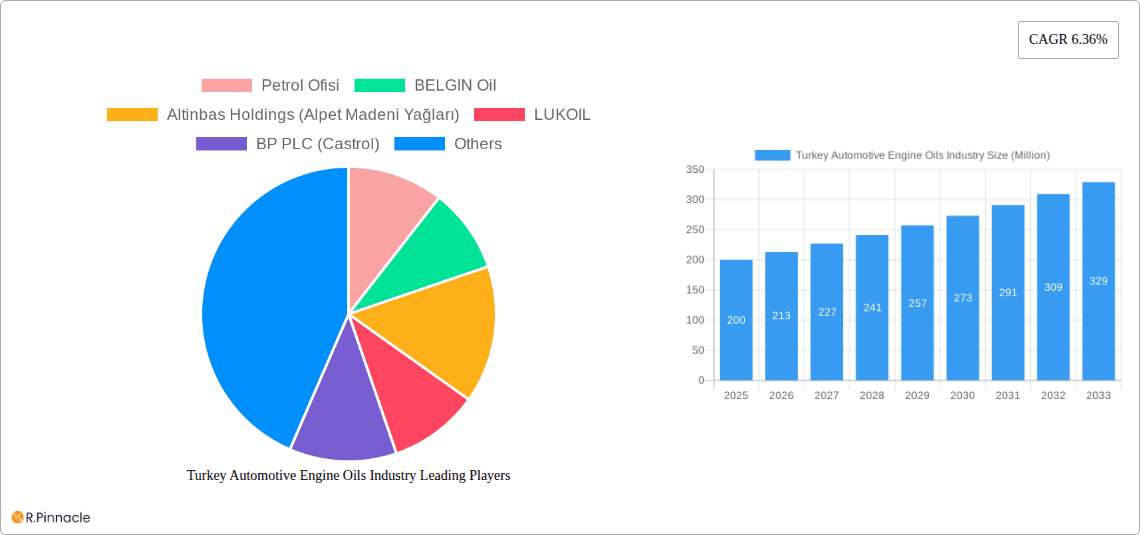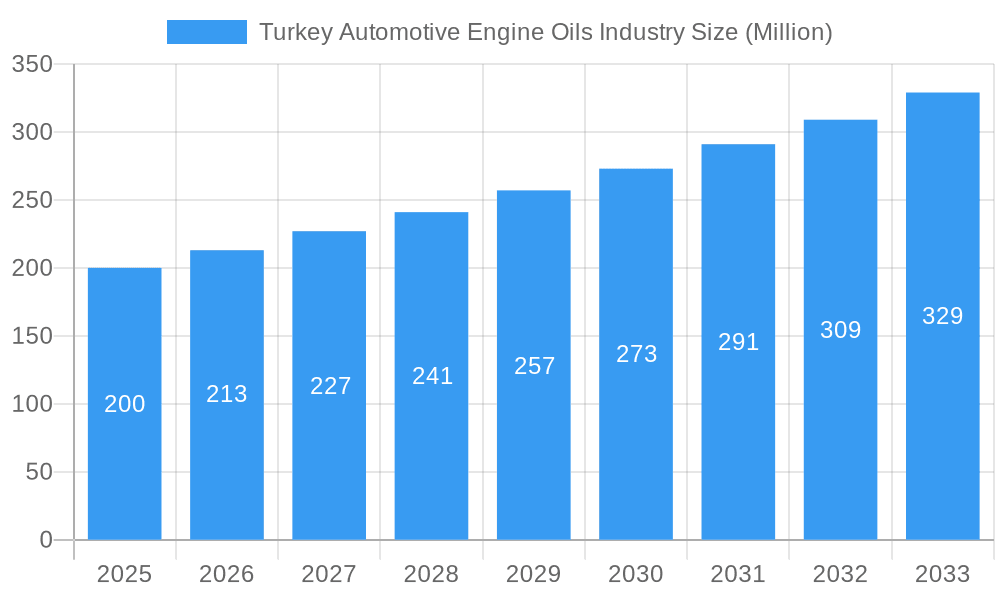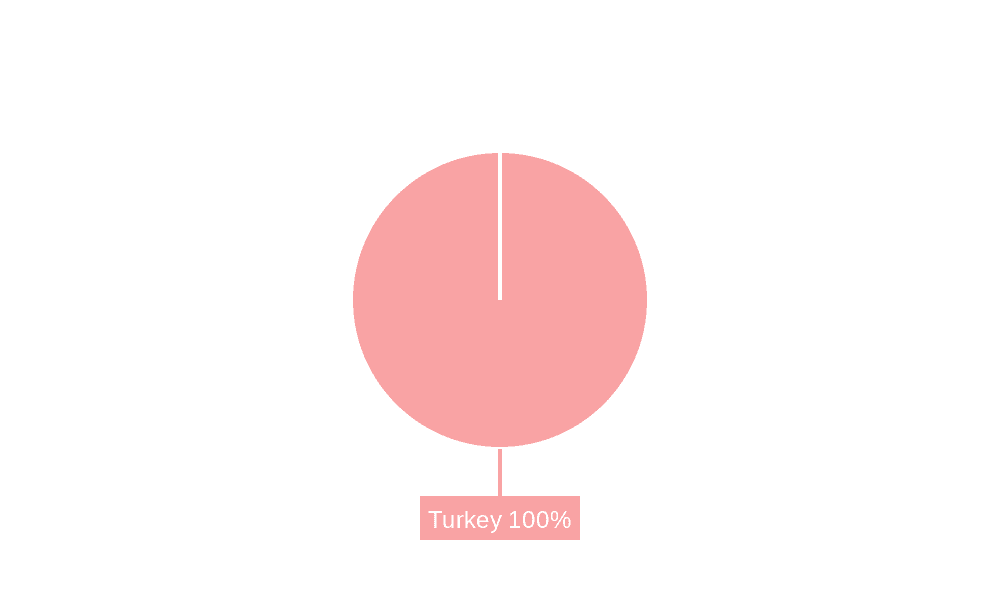Key Insights
The Turkish automotive engine oils market, valued at approximately 45.56 billion in the base year 2025, is poised for significant expansion. Projections indicate a compound annual growth rate (CAGR) of 4.8% from 2025 to 2033. Key growth drivers include the expanding vehicle parc across Turkey, encompassing passenger and commercial vehicles, which directly fuels demand. Concurrently, heightened consumer awareness regarding engine longevity and fuel efficiency through regular oil changes is stimulating adoption of premium synthetic lubricants. Evolving government regulations for cleaner vehicle emissions also indirectly boost the market by promoting specialized engine oils that meet stringent environmental standards. The competitive environment features established global brands such as BP Castrol, Shell, and TotalEnergies, alongside leading domestic players including Petrol Ofisi and LUKOIL Turkey. This dynamic competition encourages product innovation and price optimization, benefiting consumers and driving overall market growth.

Turkey Automotive Engine Oils Industry Market Size (In Billion)

Potential market restraints include economic volatility within Turkey and fluctuating global oil prices. Exchange rate fluctuations can impact imported oil pricing and consumer purchasing power for automotive maintenance. Furthermore, unpredictable crude oil prices directly influence production costs and subsequent engine oil pricing. Market segmentation analysis highlights passenger vehicles as the dominant demand segment, followed by commercial vehicles and motorcycles. This granular understanding enables strategic product development and targeted marketing efforts. The forecast period (2025-2033) anticipates sustained market expansion driven by infrastructure development, increasing vehicle sales, and a discernible trend towards higher-quality lubricant adoption.

Turkey Automotive Engine Oils Industry Company Market Share

Turkey Automotive Engine Oils Industry: A Comprehensive Market Report (2019-2033)
This in-depth report provides a comprehensive analysis of the Turkey automotive engine oils industry, offering invaluable insights for industry professionals, investors, and strategic decision-makers. Covering the period from 2019 to 2033, with a base year of 2025, this report unveils the market's dynamics, growth drivers, challenges, and future prospects. The study meticulously examines market segmentation by vehicle type (commercial vehicles, motorcycles, passenger vehicles), key players, and significant industry developments. With a forecast period extending to 2033, this report is an indispensable resource for navigating the complexities of this dynamic market.
Turkey Automotive Engine Oils Industry Market Structure & Innovation Trends
The Turkish automotive engine oils market exhibits a moderately concentrated structure, with key players like Petrol Ofisi, BELGIN Oil, Altinbas Holdings (Alpet Madeni Yağları), LUKOIL, BP PLC (Castrol), FUCHS, Demiroren (M Oil), TotalEnergies, Royal Dutch Shell PLC, and Gulf Oil International holding significant market share. Precise market share data for each company is unavailable for this report (xx%), but the industry is characterized by intense competition and a constant drive for innovation.
- Market Concentration: Moderately concentrated, with a few major players dominating.
- Innovation Drivers: Stringent emission regulations, increasing demand for fuel-efficient vehicles, and the rise of electric vehicles (EVs) are pushing innovation in lubricant technology.
- Regulatory Frameworks: Turkish regulations regarding oil quality and environmental impact significantly influence market trends.
- Product Substitutes: Bio-based lubricants and synthetic oils are emerging as substitutes, impacting the market share of conventional oils.
- End-User Demographics: The growing middle class and increasing vehicle ownership drive demand within the passenger vehicle segment.
- M&A Activities: While specific M&A deal values are unavailable (xx Million), the industry has seen several strategic partnerships and collaborations, reflecting the competitive landscape.
Turkey Automotive Engine Oils Industry Market Dynamics & Trends
The Turkey automotive engine oils market is experiencing robust growth, driven by a surge in vehicle sales and increased infrastructure development. The Compound Annual Growth Rate (CAGR) during the historical period (2019-2024) is estimated at xx%, with the forecast period (2025-2033) projected to witness a CAGR of xx%. Market penetration of high-performance synthetic oils is steadily increasing, reflecting the growing preference for enhanced engine protection and fuel efficiency. Technological advancements in lubricant formulations, catering to the rising adoption of EVs and hybrid vehicles, are also shaping market dynamics. Competitive dynamics are characterized by aggressive pricing strategies, product differentiation through enhanced performance claims, and strategic partnerships to expand market reach. Consumer preferences increasingly favor environmentally friendly and high-performance engine oils.
Dominant Regions & Segments in Turkey Automotive Engine Oils Industry
While precise regional breakdowns are unavailable, Istanbul and other major metropolitan areas are expected to be the dominant regions due to higher vehicle density and industrial activity. Among vehicle types, the passenger vehicle segment is expected to be the largest contributor to overall market size, although commercial vehicles represent a significant portion, given Turkey's robust transportation sector. Motorcycles represent a smaller but steady segment.
- Key Drivers for Passenger Vehicles: Growing middle class, rising disposable incomes, and increasing urbanization contribute to significant market growth in passenger vehicle engine oil segment.
- Key Drivers for Commercial Vehicles: The expansion of logistics and transportation networks, along with a growing construction sector, fuels high demand for commercial vehicle engine oil.
- Key Drivers for Motorcycles: A significant motorcycle population, particularly in urban areas, drives demand within this segment, although it’s smaller compared to passenger and commercial vehicles.
The dominance of passenger vehicles stems from increased vehicle ownership and the growing popularity of personal transportation. Commercial vehicles follow closely, supported by the nation's economic activities.
Turkey Automotive Engine Oils Industry Product Innovations
Recent product innovations highlight a trend towards enhanced performance and environmentally conscious formulations. The introduction of Castrol ON, a dedicated range of e-fluids for electric vehicles, exemplifies this. Manufacturers are focusing on developing oils that meet stringent emission standards and offer improved fuel economy while ensuring optimal engine protection. The market displays a trend toward the increased usage of synthetic-based oils compared to conventional mineral oils.
Report Scope & Segmentation Analysis
This report segments the Turkey automotive engine oils market primarily by vehicle type:
- Passenger Vehicles: This segment is projected to witness significant growth, driven by rising vehicle ownership and consumer demand for high-performance oils. Market size in 2025 is estimated at xx Million.
- Commercial Vehicles: This segment is characterized by high demand due to the robust trucking and transportation sector. Market size in 2025 is estimated at xx Million.
- Motorcycles: This segment, while smaller, exhibits steady growth, driven by a considerable motorcycle population in urban areas. Market size in 2025 is estimated at xx Million.
Key Drivers of Turkey Automotive Engine Oils Industry Growth
Several factors contribute to the growth of the Turkey automotive engine oils industry:
- Economic Growth: Turkey's economic expansion drives vehicle sales and associated lubricant demand.
- Technological Advancements: Innovations in lubricant formulations improve fuel efficiency and engine performance.
- Government Regulations: Emission standards necessitate the use of advanced engine oils.
Challenges in the Turkey Automotive Engine Oils Industry Sector
The industry faces challenges such as:
- Fluctuating Oil Prices: Global oil price volatility impacts production costs and profitability.
- Intense Competition: The presence of several major international and domestic players leads to intense competition.
- Economic Uncertainty: Economic downturns can reduce demand and hinder market growth.
Emerging Opportunities in Turkey Automotive Engine Oils Industry
Emerging opportunities include:
- Growth of the EV Market: The increasing adoption of electric vehicles creates demand for specialized e-fluids.
- Focus on Sustainability: Growing environmental awareness drives demand for bio-based and environmentally friendly lubricants.
- Technological Advancements: The continuous development of advanced lubricant technologies presents opportunities for market expansion.
Leading Players in the Turkey Automotive Engine Oils Industry Market
- Petrol Ofisi
- BELGIN Oil
- Altinbas Holdings (Alpet Madeni Yağları)
- LUKOIL
- BP PLC (Castrol)
- FUCHS
- Demiroren (M Oil)
- TotalEnergies
- Royal Dutch Shell PLC
- Gulf Oil International
Key Developments in Turkey Automotive Engine Oils Industry Industry
- September 2021: Total Turkey Pazarlama and Nissan Turkey partnered for a three-year agreement supplying Nissan Genuine Engine Oils, leveraging TotalEnergies' expertise. This strategic alliance significantly boosted TotalEnergies' market share and strengthened Nissan's brand image in Turkey.
- March 2021: Castrol launched Castrol ON, a new range of e-fluids for electric vehicles, enhancing its product portfolio and catering to the emerging EV market. This move positioned Castrol as a leader in the evolving EV lubricant segment.
- March 2021: Hyundai Motor Company and Royal Dutch Shell PLC formed a five-year global cooperation agreement focusing on clean energy and carbon reduction. This collaboration strengthens Shell’s position in the sustainable mobility sector and enhances Hyundai’s image as a clean energy proponent.
Future Outlook for Turkey Automotive Engine Oils Industry Market
The Turkey automotive engine oils market is poised for sustained growth, driven by economic expansion, technological advancements, and a rising focus on sustainability. The increasing penetration of EVs and hybrids will stimulate demand for specialized lubricants. Strategic collaborations and investments in R&D will further shape the market landscape. The market is expected to experience considerable growth in the forecast period, driven by economic recovery and expanding vehicle ownership.
Turkey Automotive Engine Oils Industry Segmentation
-
1. Vehicle Type
- 1.1. Commercial Vehicles
- 1.2. Motorcycles
- 1.3. Passenger Vehicles
- 2. Product Grade
Turkey Automotive Engine Oils Industry Segmentation By Geography
- 1. Turkey

Turkey Automotive Engine Oils Industry Regional Market Share

Geographic Coverage of Turkey Automotive Engine Oils Industry
Turkey Automotive Engine Oils Industry REPORT HIGHLIGHTS
| Aspects | Details |
|---|---|
| Study Period | 2020-2034 |
| Base Year | 2025 |
| Estimated Year | 2026 |
| Forecast Period | 2026-2034 |
| Historical Period | 2020-2025 |
| Growth Rate | CAGR of 4.8% from 2020-2034 |
| Segmentation |
|
Table of Contents
- 1. Introduction
- 1.1. Research Scope
- 1.2. Market Segmentation
- 1.3. Research Methodology
- 1.4. Definitions and Assumptions
- 2. Executive Summary
- 2.1. Introduction
- 3. Market Dynamics
- 3.1. Introduction
- 3.2. Market Drivers
- 3.2.1. Rising Demand For Environment-friendly Fuel and Raw Material Alternatives; Increasing Demand From Heat and Power Generation Sectors
- 3.3. Market Restrains
- 3.3.1 Problems Associated With Storage
- 3.3.2 Transportation
- 3.3.3 and Application of Pyrolysis Oil
- 3.4. Market Trends
- 3.4.1. Largest Segment By Vehicle Type
- 4. Market Factor Analysis
- 4.1. Porters Five Forces
- 4.2. Supply/Value Chain
- 4.3. PESTEL analysis
- 4.4. Market Entropy
- 4.5. Patent/Trademark Analysis
- 5. Turkey Automotive Engine Oils Industry Analysis, Insights and Forecast, 2020-2032
- 5.1. Market Analysis, Insights and Forecast - by Vehicle Type
- 5.1.1. Commercial Vehicles
- 5.1.2. Motorcycles
- 5.1.3. Passenger Vehicles
- 5.2. Market Analysis, Insights and Forecast - by Product Grade
- 5.3. Market Analysis, Insights and Forecast - by Region
- 5.3.1. Turkey
- 5.1. Market Analysis, Insights and Forecast - by Vehicle Type
- 6. Competitive Analysis
- 6.1. Market Share Analysis 2025
- 6.2. Company Profiles
- 6.2.1 Petrol Ofisi
- 6.2.1.1. Overview
- 6.2.1.2. Products
- 6.2.1.3. SWOT Analysis
- 6.2.1.4. Recent Developments
- 6.2.1.5. Financials (Based on Availability)
- 6.2.2 BELGIN Oil
- 6.2.2.1. Overview
- 6.2.2.2. Products
- 6.2.2.3. SWOT Analysis
- 6.2.2.4. Recent Developments
- 6.2.2.5. Financials (Based on Availability)
- 6.2.3 Altinbas Holdings (Alpet Madeni Yağları)
- 6.2.3.1. Overview
- 6.2.3.2. Products
- 6.2.3.3. SWOT Analysis
- 6.2.3.4. Recent Developments
- 6.2.3.5. Financials (Based on Availability)
- 6.2.4 LUKOIL
- 6.2.4.1. Overview
- 6.2.4.2. Products
- 6.2.4.3. SWOT Analysis
- 6.2.4.4. Recent Developments
- 6.2.4.5. Financials (Based on Availability)
- 6.2.5 BP PLC (Castrol)
- 6.2.5.1. Overview
- 6.2.5.2. Products
- 6.2.5.3. SWOT Analysis
- 6.2.5.4. Recent Developments
- 6.2.5.5. Financials (Based on Availability)
- 6.2.6 FUCHS
- 6.2.6.1. Overview
- 6.2.6.2. Products
- 6.2.6.3. SWOT Analysis
- 6.2.6.4. Recent Developments
- 6.2.6.5. Financials (Based on Availability)
- 6.2.7 Demiroren (M Oil)
- 6.2.7.1. Overview
- 6.2.7.2. Products
- 6.2.7.3. SWOT Analysis
- 6.2.7.4. Recent Developments
- 6.2.7.5. Financials (Based on Availability)
- 6.2.8 TotalEnergie
- 6.2.8.1. Overview
- 6.2.8.2. Products
- 6.2.8.3. SWOT Analysis
- 6.2.8.4. Recent Developments
- 6.2.8.5. Financials (Based on Availability)
- 6.2.9 Royal Dutch Shell PLC
- 6.2.9.1. Overview
- 6.2.9.2. Products
- 6.2.9.3. SWOT Analysis
- 6.2.9.4. Recent Developments
- 6.2.9.5. Financials (Based on Availability)
- 6.2.10 Gulf Oil International
- 6.2.10.1. Overview
- 6.2.10.2. Products
- 6.2.10.3. SWOT Analysis
- 6.2.10.4. Recent Developments
- 6.2.10.5. Financials (Based on Availability)
- 6.2.1 Petrol Ofisi
List of Figures
- Figure 1: Turkey Automotive Engine Oils Industry Revenue Breakdown (billion, %) by Product 2025 & 2033
- Figure 2: Turkey Automotive Engine Oils Industry Share (%) by Company 2025
List of Tables
- Table 1: Turkey Automotive Engine Oils Industry Revenue billion Forecast, by Vehicle Type 2020 & 2033
- Table 2: Turkey Automotive Engine Oils Industry Volume K Litres Forecast, by Vehicle Type 2020 & 2033
- Table 3: Turkey Automotive Engine Oils Industry Revenue billion Forecast, by Product Grade 2020 & 2033
- Table 4: Turkey Automotive Engine Oils Industry Volume K Litres Forecast, by Product Grade 2020 & 2033
- Table 5: Turkey Automotive Engine Oils Industry Revenue billion Forecast, by Region 2020 & 2033
- Table 6: Turkey Automotive Engine Oils Industry Volume K Litres Forecast, by Region 2020 & 2033
- Table 7: Turkey Automotive Engine Oils Industry Revenue billion Forecast, by Vehicle Type 2020 & 2033
- Table 8: Turkey Automotive Engine Oils Industry Volume K Litres Forecast, by Vehicle Type 2020 & 2033
- Table 9: Turkey Automotive Engine Oils Industry Revenue billion Forecast, by Product Grade 2020 & 2033
- Table 10: Turkey Automotive Engine Oils Industry Volume K Litres Forecast, by Product Grade 2020 & 2033
- Table 11: Turkey Automotive Engine Oils Industry Revenue billion Forecast, by Country 2020 & 2033
- Table 12: Turkey Automotive Engine Oils Industry Volume K Litres Forecast, by Country 2020 & 2033
Frequently Asked Questions
1. What is the projected Compound Annual Growth Rate (CAGR) of the Turkey Automotive Engine Oils Industry?
The projected CAGR is approximately 4.8%.
2. Which companies are prominent players in the Turkey Automotive Engine Oils Industry?
Key companies in the market include Petrol Ofisi, BELGIN Oil, Altinbas Holdings (Alpet Madeni Yağları), LUKOIL, BP PLC (Castrol), FUCHS, Demiroren (M Oil), TotalEnergie, Royal Dutch Shell PLC, Gulf Oil International.
3. What are the main segments of the Turkey Automotive Engine Oils Industry?
The market segments include Vehicle Type, Product Grade.
4. Can you provide details about the market size?
The market size is estimated to be USD 45.56 billion as of 2022.
5. What are some drivers contributing to market growth?
Rising Demand For Environment-friendly Fuel and Raw Material Alternatives; Increasing Demand From Heat and Power Generation Sectors.
6. What are the notable trends driving market growth?
Largest Segment By Vehicle Type : <span style="font-family: 'regular_bold';color:#0e7db3;">Commercial Vehicles</span>.
7. Are there any restraints impacting market growth?
Problems Associated With Storage. Transportation. and Application of Pyrolysis Oil.
8. Can you provide examples of recent developments in the market?
September 2021: Total Turkey Pazarlama and Nissan Turkey signed a new arrangement under which Nissan Turkey will deliver Nissan Genuine Engine Oils to its Turkish clients for the next three years. Nissan Genuine Engine Oils are created with the help of TotalEnergies' lubricant expertise.March 2021: Castrol announced the launch of Castrol ON (a Castrol e-fluid range that includes e-gear oils, e-coolants, and e-greases) to its product portfolio. This range is specially designed for electric vehicles.March 2021: Hyundai Motor Company and Royal Dutch Shell PLC announced a five-year global business cooperation agreement, with a new focus on clean energy and carbon reduction, to help Hyundai continue its transformation as a Smart Mobility Solution Provider.
9. What pricing options are available for accessing the report?
Pricing options include single-user, multi-user, and enterprise licenses priced at USD 3800, USD 4500, and USD 5800 respectively.
10. Is the market size provided in terms of value or volume?
The market size is provided in terms of value, measured in billion and volume, measured in K Litres.
11. Are there any specific market keywords associated with the report?
Yes, the market keyword associated with the report is "Turkey Automotive Engine Oils Industry," which aids in identifying and referencing the specific market segment covered.
12. How do I determine which pricing option suits my needs best?
The pricing options vary based on user requirements and access needs. Individual users may opt for single-user licenses, while businesses requiring broader access may choose multi-user or enterprise licenses for cost-effective access to the report.
13. Are there any additional resources or data provided in the Turkey Automotive Engine Oils Industry report?
While the report offers comprehensive insights, it's advisable to review the specific contents or supplementary materials provided to ascertain if additional resources or data are available.
14. How can I stay updated on further developments or reports in the Turkey Automotive Engine Oils Industry?
To stay informed about further developments, trends, and reports in the Turkey Automotive Engine Oils Industry, consider subscribing to industry newsletters, following relevant companies and organizations, or regularly checking reputable industry news sources and publications.
Methodology
Step 1 - Identification of Relevant Samples Size from Population Database



Step 2 - Approaches for Defining Global Market Size (Value, Volume* & Price*)

Note*: In applicable scenarios
Step 3 - Data Sources
Primary Research
- Web Analytics
- Survey Reports
- Research Institute
- Latest Research Reports
- Opinion Leaders
Secondary Research
- Annual Reports
- White Paper
- Latest Press Release
- Industry Association
- Paid Database
- Investor Presentations

Step 4 - Data Triangulation
Involves using different sources of information in order to increase the validity of a study
These sources are likely to be stakeholders in a program - participants, other researchers, program staff, other community members, and so on.
Then we put all data in single framework & apply various statistical tools to find out the dynamic on the market.
During the analysis stage, feedback from the stakeholder groups would be compared to determine areas of agreement as well as areas of divergence


